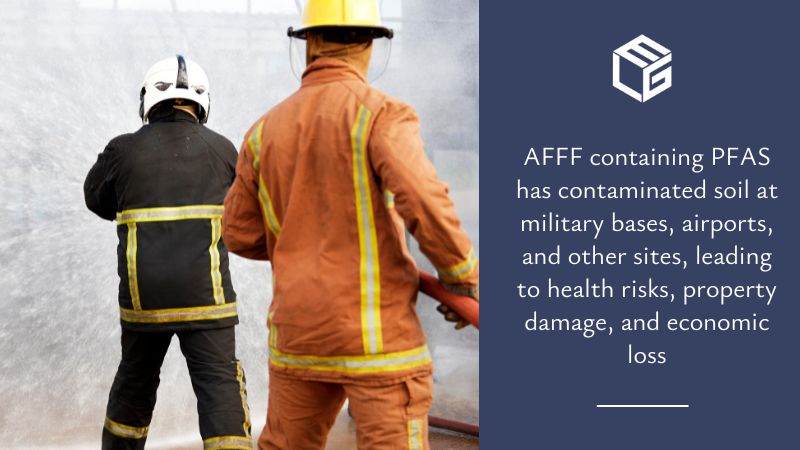-
About »
- Insulin MDL
-
Cases »
- Diseases
- Testimonials
- Government
- Contact
- Get Help Now
-

Aqueous film-forming foam (AFFF) is a type of fire-suppressant foam used for fighting high-hazard flammable liquid fires. Although AFFF is highly effective, it has recently been found to be toxic due to the presence of per- and polyfluoroalkyl substances (PFAS). Increasing scientific and medical evidence shows that exposure to PFOA and PFOS through AFFF is related to multiple types of cancer. The AFFF MDL-2873 was closed on September 5th, and although it’s still possible to file for compensation, the process is more complicated. We trust that the Protecting Firefighters from Adverse Substances Act, or the PFAS Act, will be signed into law soon. If you suspect that your cancer was caused by exposure to AFFF, get in touch with our attorneys, who will file an AFFF lawsuit on your behalf and help you recover the financial compensation you deserve.
Claim ApplicationInternational studies on firefighters confirmed an increased risk of testicular cancer, which can even be considered an occupational disease for firefighters. Besides accumulating in the blood, PFAS accumulate throughout life, especially in the liver and kidneys, increasing the risk of developing cancer.
Firefighters were never told about the health consequences of AFFF, and no one made much effort to stop it from escaping into the environment. The following are the diseases qualifying for filing a claim with the manufacturers of AFFF if you decide to file with ELG Law:
Health organizations such as The Centers for Disease Control and Prevention (CDC), American Cancer Society (ACS), and U.S. Environment Protection Agency (EPA) have found that certain PFAS may affect the immune system and increase the risk of cancer.
The EPA has classified the chemicals in the foam products as "emerging contaminants", meaning that the health hazards and environmental risks associated with AFFF are significant. Recently, the International Agency for Research on Cancer (IARC) classified PFOA as a "possible carcinogenic to humans", based on evidence of bladder cancer from studies in factory workers exposed to PFOA.
The U.S. military used AFFF during firefighter training and during emergencies. AFFF containing PFAS has also been used in various ways by the U.S. Navy, Army, Coast Guard, Air Force, and Marine Corps since 1960.
Those most affected by exposure to AFFF are firefighters who worked in:
Firefighters directly confronted with type B fuel-based fires are at the highest risk:
The aqueous film-forming foams (AFFF) are fluorinated substances that are mixed with water to produce an aqueous film that spreads across the surface of a hydrocarbon fuel (oils, gasoline, petroleum greases, tars, and solvents or alcohols) to extinguish the fire by forming a vapor barrier between the fuel and the oxygen in the atmosphere to prevent reignition.
According to the Interstate Technology & Regulatory Council, there are three types of AFFF:
By virtue of the recently introduced Firefighter PFAS Injury Compensation Act of 2024, firefighters who worked for at least two years in this occupational field and developed a health condition related to PFAS exposure, cancerous or non-cancerous, might be able to obtain financial compensation from the Secretary of Health and Human Services. They have up to two years after the regulations are finalized to submit their claim form.
If you are a civilian (career or voluntary), or military firefighter who has been exposed to AFFF and later was diagnosed with a linkable cancer, you have the right to hold the manufacturers accountable for the harm they caused and receive financial compensation. While no amount of money can erase the pain you suffer, the compensation can ease the financial burdens associated with the injury and potentially hold the negligent entity responsible for its actions. Environmental Litigation Group P.C. has filed a number of personal injury claims to fight for victims of AFFF contamination. Our knowledgeable AFFF lawyers have experience with all types of environmental toxic exposure cases. Our firm serves on the Plaintiffs Executive Committee for nationwide litigation and is heavily involved in working with other lawyers from around the country.
When a product is designed and marketed as a safe one, the last thing it should do is harm you. But when a manufacturer misrepresents the safety of its products, this raises the question of whether the manufacturer tested the product appropriately or knowingly released it to the public with a defect.
Regarding AFFF foam products, it seems that chemical manufacturers deliberately ignored evidence of the harmful effects resulting from exposure to toxic chemicals on the health of military personnel, firefighters, private citizens, and the environment.
The underlying chemical, PFOA (perfluorooctanoic acid), was developed in the 1950s. AFFF (Aqueous Film-Forming Foam) was commercially used beginning in the early 1970s.
The AFFF products were designed, marketed, manufactured, distributed, and sold by one or more of the following companies named as defendants in current legal processes:
3M and the other chemical companies are currently facing a growing number of AFFF lawsuits over chemical-based firefighting foam sold for more than 50 years and used extensively at U.S. military bases, airports, and other industrial sites around the country.
The U.S. Department of Veterans Affairs has accepted that veteran firefighters may have been affected by exposure to PFOS and PFOA. The department has added the chemicals to its list of possible toxic military exposures and asks veterans to report any health problems associated with exposure to the firefighting foam. If you are a veteran firefighter who meets the eligibility criteria, you may be eligible for compensation from the VA or from the manufacturer of the product. If you have been harmed by toxic AFFF exposure, give our AFFF attorneys a call to discuss your legal options.

